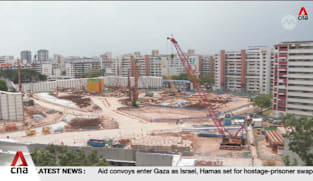Committee of Supply 2024 debate, Day 1: Indranee Rajah on strategies to address Singapore’s record low TFR
Singapore’s total fertility rate (TFR) has dropped to below 1.0 for the first time. According to preliminary estimates, the resident TFR stood at 0.97 in 2023. Last year, there were 26,500 resident marriages and 30,500 resident births. However, there were fewer resident marriages and births annually. Minister in the Prime Minister's Office Indranee Rajah, who gave this update in Parliament on Wednesday (Feb 28), said there are various reasons for Singapore's low fertility. Some are temporal - couples had their marriage plans disrupted by COVID-19 which may in turn have delayed their parenthood plans - while others cite concerns about the financial costs of child-raising, pressures to be an excellent parent or difficulties managing work and family commitments. More broadly, Singapore’s low fertility reflects a global phenomenon where individual priorities and societal norms have shifted, said Ms Indranee. She warned that a falling TFR will impact Singapore’s economy as it will be increasingly challenging to maintain dynamism to attract global businesses and create opportunities for the next generation. She urged young Singaporeans to actively build and develop relationships and “intentionally factor marriage and parenthood” into their life plans early. She said the Government will provide a conducive environment for couples who wish to start, grow and nurture their families. Ms Indranee stressed that Singaporeans and their well-being are at the heart of the Government’s population strategies. These strategies aim to build a resilient nation, anchored on the key thrusts of the Forward Singapore report of opportunities, assurance and collective responsibility. “We will not let up on efforts to support Singaporeans in starting and raising families so that we may forge a strong Singaporean citizenry. For this to happen, we need everyone to do their part. While some of the bolder changes and mindset shifts may require more time, I call on everyone - individuals, families, employers and communities - to contribute towards shaping a Singapore that is Made for Families so that we can secure our future and thrive for years to come,” she said.
Singapore’s total fertility rate (TFR) has dropped to below 1.0 for the first time. According to preliminary estimates, the resident TFR stood at 0.97 in 2023. Last year, there were 26,500 resident marriages and 30,500 resident births. However, there were fewer resident marriages and births annually. Minister in the Prime Minister's Office Indranee Rajah, who gave this update in Parliament on Wednesday (Feb 28), said there are various reasons for Singapore's low fertility. Some are temporal - couples had their marriage plans disrupted by COVID-19 which may in turn have delayed their parenthood plans - while others cite concerns about the financial costs of child-raising, pressures to be an excellent parent or difficulties managing work and family commitments. More broadly, Singapore’s low fertility reflects a global phenomenon where individual priorities and societal norms have shifted, said Ms Indranee. She warned that a falling TFR will impact Singapore’s economy as it will be increasingly challenging to maintain dynamism to attract global businesses and create opportunities for the next generation. She urged young Singaporeans to actively build and develop relationships and “intentionally factor marriage and parenthood” into their life plans early. She said the Government will provide a conducive environment for couples who wish to start, grow and nurture their families. Ms Indranee stressed that Singaporeans and their well-being are at the heart of the Government’s population strategies. These strategies aim to build a resilient nation, anchored on the key thrusts of the Forward Singapore report of opportunities, assurance and collective responsibility. “We will not let up on efforts to support Singaporeans in starting and raising families so that we may forge a strong Singaporean citizenry. For this to happen, we need everyone to do their part. While some of the bolder changes and mindset shifts may require more time, I call on everyone - individuals, families, employers and communities - to contribute towards shaping a Singapore that is Made for Families so that we can secure our future and thrive for years to come,” she said.



















